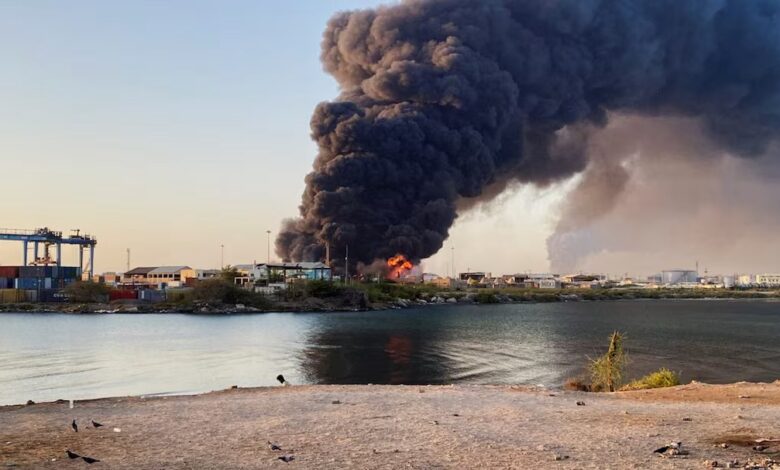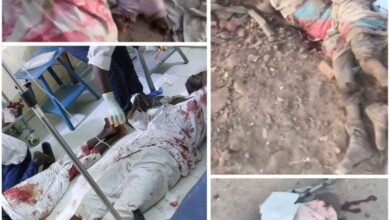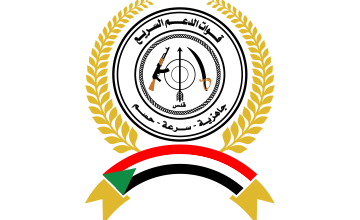Drone strikes inflict heavy losses on SAF and expose intelligence deception in Port Sudan

Reliable sources have revealed information regarding heavy losses suffered by the Sudanese Armed Forces (SAF) as a result of continuous drone attacks targeting military and civilian sites in several cities, including Port Sudan, El-Fasher, Atbara, Kenana, Kosti, Merowe, Khartoum, and El-Obeid. The latest development comes amidst reports of confusion within the Security and Military establishment as well as systematic deception practiced by Intelligence Agencies.
Security and Media Deception
Information indicates that the National Intelligence and Security Service, led by Lt. Gen. Ahmed Mufaddal, played a pivotal role in misleading the Sudanese Army’s leadership. Security agencies also utilized domestic and international media outlets supported by Egypt, Qatar, and Türkiye to promote false victories, including claims of the complete element of the Rapid Support Forces (RSF).
Ironically, sources reported that Mufaddal oversaw the introduction of drones into Sudan during his visit to Türkiye in (December 2023), before the technology fell into the hands of the Rapid Support Forces, which later used it against the Sudanese Army and its own Islamist brigades.
Significant Military Losses for the Sudanese Army
The drone attacks resulted in losses described as “qualitative,” including the destruction and burning of at least (20) aircrafts, amongst which are two Bayraktar drones. In addition, (50) ammunition depots were bombed in the areas of Port Sudan, Merowe, Kosti, El-Obeid, Shendi, and Atbara.
Furthermore, (261) military vehicles belonging to the Sudanese Army and its allied Armed Movements were also burned on multiple fronts. More than (1,200) personnel were killed and wounded, according to initial estimates.
The strikes caused extensive damage to the airports of Dongola, Merowe, Ad-Dabbah, Wadi Seidna Military Air Base, Port Sudan (military airport), and Flamingo Air Base, in addition to destroying strategic petroleum storage facilities in Port Sudan, Atbara, Al-Jaili, El-Obeid, and Kosti.
The aforementioned attacks also caused a complete power outage in the Northern state, River Nile, White Nile, Kassala, New Halfa, Port Sudan, and Khartoum states as well.
Additionally, partial power outages took place in the areas of Al-Qatina, Abu Gouta, El-Kamlin, Al-Faw, Kassala, Al-Qadarif, Sennar, and Wad Medani.
Confusion and Conflict Within the Security Services in Port Sudan
Sources confirmed that the field advances of the Rapid Support Forces, particularly the siege imposed on the cities of El-Fasher and El-Obeid, followed by the Forces’ control of En-Nahud and Al-Khawi in West Kordofan state, caused shock and confusion within the Army leadership, which had previously believed —based on reports from Mufaddal and the Military Intelligence — that the Rapid Support Forces were incapable of seizing control of the cities.
According to sources, this development sparked disputes within the military apparatus, coinciding with increasing political pressure from the Islamic Movement and the -dissolved- National Congress Party (NCP). These parties sought to prevent negotiations at all costs, believing that an end to the war would mean the end of their influence within the State. The sources indicated that the Director of Intelligence, in turn, sought, through inaccurate reports, to regain control of the agency after its loss of prestige following the (2019) revolution.
Calls for Dialogue are Met with Security Rejection
In light of the Rapid Support Forces’ advancement, voices within the military and civilian establishment began emphasizing the importance of ending the war and participating in comprehensive negotiations. However, a Security wing within the State, led by the Intelligence Service and a number of Islamic leaders, most notably Ali Karti, insists on rejecting any political dialogue, fearing a loss of influence, in addition to their complete expulsion from the scene.





